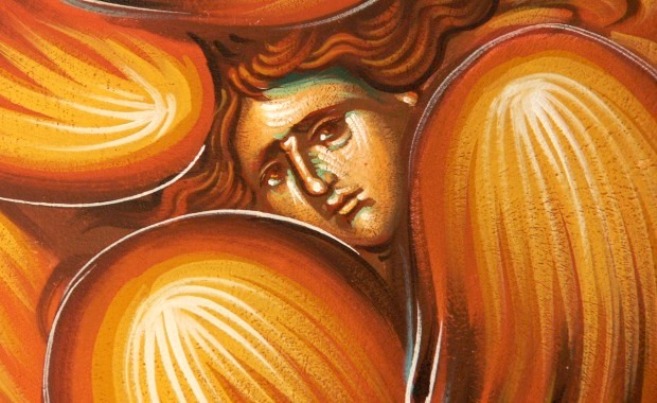
by Fr. Patrick Henry Reardon
In the measure that the ascending Christ quits the company of men on earth, he associates himself with the company of the angels in heaven. Saint John testifies that he receives in heaven the homage from “the voice of many angels”:
“Worthy is the Lamb who was slain / To receive power and abundance and wisdom, / And strength and honor and glory and blessing!”
It was entirely fitting, then, that angelic witnesses explained to the gazing Apostles the meaning of the Ascension (Acts 1:11).
But elsewhere Holy Scripture seems to indicate that not all the angels in heaven possessed—at the time—a full understanding of the Ascension.
Take, for instance, Psalm 23 (Hebrew 24), which the liturgical tradition of the Church understands as a hymn honoring the Lord’s Ascension. In this psalm the inspired poet, referring to the mediation of Christ in the heavenly sanctuary, inquires,
“Who may ascend unto the mountain of the Lord? / Or who may stand in His holy place?”
Then, after a description of the Messiah, who is qualified so to ascend and so to stand, there follows a sort of heavenly dialogue respecting the identity of this Messiah. Even as he draws nigh the gates of heaven, there appears to be some question about who he really is. He is not immediately recognized. The angelic “princes” (archontes, Latin principes) twice ask for clarification:
Lift up your gates, ye princes /
And be lifted up, you everlasting doors, /
And the King of Glory will enter!Who is this King of Glory?
The Lord, mighty and powerful, /
The Lord, powerful in battle.Lift up your gates, ye princes /
And be lifted up, you everlasting doors, /
And the King of Glory will enter!Who is this King of Glory?
The Lord of hosts, /
He is the king of Glory.
Who, then, are the dramatis personae, the prosopa, in this exchange at the gates of heaven? Who is talking to whom in this celestial conversation?
In the mid-second century Justin Martyr speculated on the question in his argument with Trypho the Jew:
“When our Messiah (ho hemeteros Christos) rose from the dead and ascended to heaven, the princes who had been given charge in heaven by God are commanded to open the gates of heaven, that he who is the King of Glory (Basilevs tes Doxses) may enter in and—having ascended—may sit on the right hand of the Father until He makes the enemies his footstool. (This last part is manifest in another Psalm.) For when the rulers of heaven saw him having an uncomely and dishonored appearance, and inglorious (adoxson), not recognizing him, they asked, ‘Who is this King of glory?’ And the Holy Spirit, either in the person of the Father (apo prosopou Patros), or in His own, answers them, ‘the Lord of hosts, he is this King of glory'” (Dialogue with Trypho 36).
Three points seem particularly worthy of note in Justin’s exegesis of Psalm 23:
First, this appears to be the first instance in which Psalm 23 is joined with Psalm 109 (Hebrew 110) in the imagination of the Church.
Second, the angels guarding the gates of heaven, even after all the mighty events in the life of Christ—what Luke calls the “many infallible proofs”—are still uncertain of his true identity. According to Justin, their uncertainty arises from the marks of the Passion that remain on the flesh of the glorified Christ.
“Of uncomely and dishonored appearance,”
he is still perceived to be the Suffering Servant described in Isaiah 53.
Third, the Holy Spirit gives a new revelation to the angels themselves. We observe that Justin is not definite or dogmatic about the “voice” (the prosopon) that proclaims the identity of the Ascending One.
In fact, other Church Fathers suggest that this may be a dialogue between the angels guarding heaven and the angels who were Christ’s companions on earth. The former, ever busy keeping intruders out of heaven, failed to recognize God’s Son in the ascending figure, so the latter angels had to inform them. Irenaeus of Lyons, Athanasius of Alexandria, and Gregory of Nyssa share this view.
